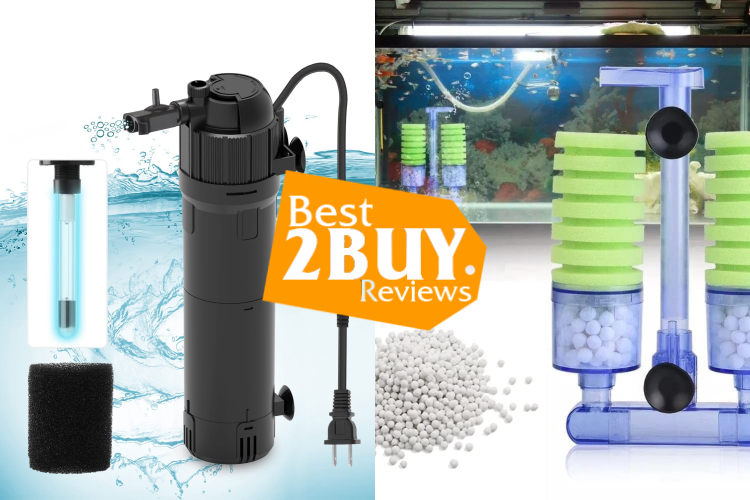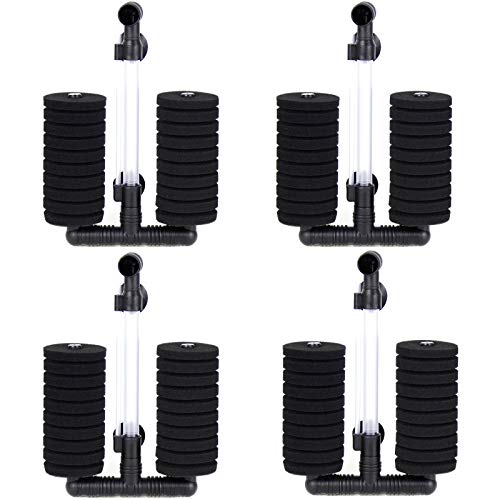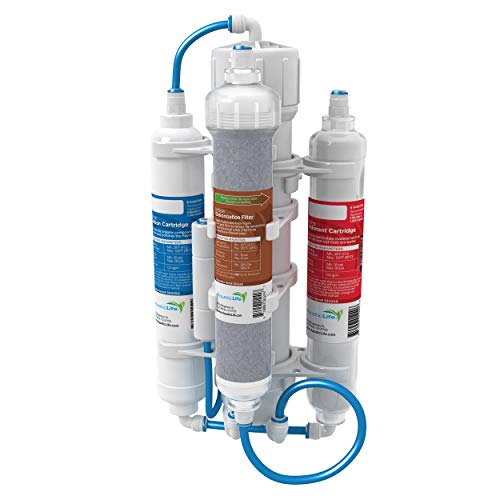How to Choose the Aquarium Filters
Aquarium filters are essential components of any aquarium setup, as they help maintain water quality by removing waste, debris, and harmful substances from the water. They promote a healthy and stable environment for aquatic life by mimicking natural filtration processes.
- 1. Types of aquarium filters
- 1.1. Mechanical Filters
- 1.2. Biological Filters
- 1.3. Chemical Filters
- 1.4. Undergravel Filters
- 1.5. Canister Filters
- 1.6. Hang-On-Back (HOB) Filters
- 1.7. Sponge Filters
- 1.8. Fluidized Bed Filters
- 2. Why must buy Aquarium Filters?
- 2.1. Maintaining Water Quality
- 2.2. Biological Filtration
- 2.3. Oxygenation
- 2.4. Reduced Algae Growth
- 2.5. Clear Water
- 2.6. Disease Prevention
- 2.7. Reduced Maintenance
- 2.8. Long-Term Health of Aquatic Life
- 2.9. Cycling New Tanks
- 2.10. Aquarium Aesthetics
- 3. How to choose Aquarium Filters?
- 3.1. Tank Size
- 3.2. Filtration Needs
- 3.3. Fish and Inhabitants
- 3.4. Water Flow and Oxygenation
- 3.5. Ease of Maintenance
- 3.6. Noise Level
- 3.7. Filter Media
- 3.8. Installation
- 3.9. Budget
- 3.10. Brand and Reviews
- 3.11. Tank Type
- 3.12. Future Expansion
- 3.13. Warranty and Customer Support
- 4. In conclusion
Types of aquarium filters
There are several types of aquarium filters available, each with its own mechanisms and benefits:
Mechanical Filters
These filters physically trap and remove debris, uneaten food, and other particulate matter from the water. They typically consist of foam pads, filter floss, or other porous materials that capture larger particles.
Biological Filters
Biological filters foster the growth of beneficial bacteria that break down toxic ammonia and nitrite produced by fish waste. The bacteria colonize filter media with high surface area, such as ceramic rings, bio-balls, or specialized bio-sponges.
Chemical Filters
Chemical filters use various chemical media, such as activated carbon or zeolite, to adsorb or remove dissolved impurities, odors, and discoloration from the water. These filters are particularly useful for removing medications or specific pollutants.
Undergravel Filters
These filters are placed beneath the aquarium substrate and create a flow of water through the gravel, which promotes biological filtration. They are less common nowadays due to advances in other filtration methods.
Canister Filters
Canister filters are external filters that provide mechanical, biological, and sometimes chemical filtration. They have multiple chambers filled with different filter media and are suitable for larger aquariums.
Hang-On-Back (HOB) Filters
HOB filters are attached to the back of the aquarium and draw water up from the tank, passing it through various filter media before returning it. They are popular for their ease of use and maintenance.
Sponge Filters
Sponge filters use an air pump to draw water through a sponge, providing both mechanical and biological filtration. They are often used in small aquariums or as supplemental filters.
Fluidized Bed Filters
These filters suspend filter media in a fluidized state, creating a high surface area for beneficial bacteria to colonize. They are effective for biological filtration.
The choice of aquarium filter depends on factors such as tank size, the type of aquatic life, and the desired level of maintenance. Many aquarium enthusiasts use a combination of different filters to achieve optimal water quality. Regular maintenance, including cleaning or replacing filter media and performing water changes, is crucial to ensure the effectiveness of the filtration system and the health of the aquarium inhabitants.

Why must buy Aquarium Filters?
Purchasing an aquarium filter is highly recommended for several important reasons:
Maintaining Water Quality
Aquarium filters play a crucial role in maintaining water quality by removing waste, uneaten food, and other organic matter. This helps prevent the accumulation of harmful substances like ammonia and nitrite, which can be toxic to aquatic life.
Biological Filtration
Filters support the growth of beneficial bacteria that break down ammonia and nitrite into less harmful compounds, such as nitrate. These bacteria are essential for establishing a stable and healthy nitrogen cycle in the aquarium.
Oxygenation
Many types of filters, such as air-driven sponge filters, create water movement at the surface, promoting gas exchange and increasing the oxygen levels in the water. Adequate oxygenation is vital for the well-being of fish and other aquatic organisms.
Reduced Algae Growth
Proper filtration helps prevent the buildup of excess nutrients in the water, which can contribute to algae growth. By removing organic compounds, filters help keep the water clear and reduce the likelihood of algae blooms.
Clear Water
A well-maintained filter aids in removing particles that cause cloudiness and turbidity in the aquarium water, resulting in a clearer and more visually appealing tank.
Disease Prevention
Efficient filtration can reduce the presence of pathogens and parasites in the water, helping to prevent diseases from spreading among your aquarium inhabitants.
Reduced Maintenance
While filters require regular maintenance, they significantly reduce the frequency and intensity of other maintenance tasks, such as water changes and substrate cleaning. This makes it easier to keep the aquarium clean and the water parameters stable.
Long-Term Health of Aquatic Life
Consistent use of an appropriate filter contributes to the overall health and well-being of your fish and other aquatic organisms. Clean, well-filtered water provides a stress-free environment that supports growth and longevity.
Cycling New Tanks
When setting up a new aquarium, a filter is crucial to establish the nitrogen cycle. This cycle involves the growth of beneficial bacteria that convert toxic ammonia into less harmful compounds. A filter helps to speed up and stabilize this process, allowing you to safely introduce fish to the tank.
Aquarium Aesthetics
Clear water and a well-maintained environment enhance the visual appeal of your aquarium, allowing you to fully enjoy the beauty of your aquatic ecosystem.
How to choose Aquarium Filters?
Choosing the right aquarium filter is crucial for maintaining a healthy and thriving aquatic environment. Here are some factors to consider when selecting an aquarium filter:
Tank Size
The size of your aquarium is a key consideration. Larger tanks generally require more powerful filters with higher flow rates to ensure effective filtration. Smaller tanks may benefit from smaller filters or sponge filters.
Filtration Needs
Determine the type of filtration your aquarium requires. Do you need mechanical, biological, and/or chemical filtration? Some filters offer a combination of these functions, while others specialize in one area.
Fish and Inhabitants
Consider the types and number of fish, as well as other inhabitants like invertebrates or plants, in your aquarium. Some fish produce more waste than others, and heavily stocked tanks may require more robust filtration.
Water Flow and Oxygenation
Adequate water movement and surface agitation are important for oxygen exchange. Filters that create gentle water movement can prevent dead spots and ensure oxygen reaches all areas of the tank.
Ease of Maintenance
Choose a filter that is easy to clean and maintain. Filters with easily accessible media compartments and simple disassembly can save you time and effort during routine maintenance.
Noise Level
Some filters, particularly air-driven or powerhead filters, can be noisy. Consider the noise level of the filter and its impact on your living space.
Filter Media
Different filters use various types of filter media. Look for filters that allow you to customize or combine filter media to meet your specific needs. High-quality biological media with ample surface area are particularly important for cultivating beneficial bacteria.
Installation
Consider the installation process and whether the filter can be easily set up in your aquarium. Some filters hang on the back of the tank, while others may need to be placed inside the tank or underneath the substrate.
Budget
Aquarium filters come in a range of prices. While it's important to find a filter that meets your needs, try to balance your budget with the quality and features you require.
Brand and Reviews
Research reputable brands and read reviews from other aquarium enthusiasts. Reviews can provide insights into the performance, reliability, and ease of use of different filters.
Tank Type
The type of aquarium you have (freshwater, saltwater, planted, reef, etc.) can influence your choice of filter. Some filters are better suited for specific types of setups.
Future Expansion
If you plan to expand your aquarium or add more fish in the future, choose a filter that can accommodate the increased bio-load.
Warranty and Customer Support
Check the manufacturer's warranty and customer support options in case you encounter any issues with the filter.
Remember that no single filter is universally perfect for all aquariums. It's often a good idea to incorporate multiple types of filtration, such as a combination of mechanical and biological filters, to ensure comprehensive water quality management. Consulting with experienced aquarium hobbyists or professionals can also provide valuable insights when making your decision.
In conclusion
In summary, an aquarium filter is an essential tool for creating a healthy and balanced aquatic environment. It helps maintain water quality, supports biological processes, prevents the buildup of toxins, and contributes to the overall success and enjoyment of your aquarium hobby.
To buy aquarium filter, you can buy in store but if you don’t have time, I recommend you to buy in Amazon. That platform offer you with various products and wide range price together promotion. Buy in Amazon, you will easily find your need. To make you easily choose aquarium filter in Amazon, we selected top best seller aquarium filter in our website. Read carefully and Enjoy!
I’m Jane Smith, editor at best2buy.reviews. If you have any questions, please feel free to let me know. I’m always availabe to respone any your questions.










